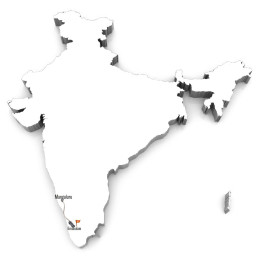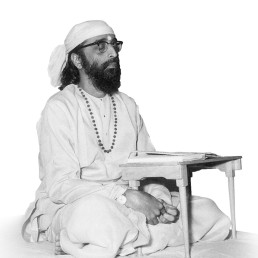
Jnana Yajna 83

Year & Dates:
April 01, 1961 to April 11, 1961

Yajna Topic:
Shrimad Bhagavad Gita- Chapter 13

Place:
Ernakulam, India.
On His way to Ernakulam for His 83rd Jnana Yajna after a successful but hectic yajna at Mangalore, Pujya Gurudev had barely rested on the train because of devotees who rushed to meet Him in every station.
From station to station…When the train pulled into Shoranur station at 3 am on April 1, 1961, He was received by the enthusiastic members of the Tripunithura yajna committee and escorted to Ernakulam; His aunt, Kochu Narayani Amma whom He looked upon as His mother, was delighted to see Pujya Gurudev. In a short while, He had to leave with the Ernakulam yajna committee members to the Ernakulam railway station back again to accommodate the loving reception planned for Him from that location! He accepted, with great kindness, to be part of a joyful reception procession and finally reached the Amma Raja Palace where the yajnashala and his place of stay stood waiting. His long day had just begun.
Paramount, Powerful Giver
Two receptions, two processions, two spirited inaugurations, and three texts – Between Tirupunithura and Ernakulam which are separated by just under 6 miles, Pujya Gurudev shuttled tirelessly, spreading knowledge with inestimable amounts of love.
Kenopanishad: At Tirupunithura, He listened quietly to the praise given by Justice Govinda Menon who inaugurated that segment of the three-in-one 83rd yajna. He reminded the audience how sages, having observed, analyzed, and contemplated on the science of life revealed their knowledge not for just philosophizing but actually living those truths. The text He would expound on that stage was Kenopanishad.
Ishavasya and Gita: The next evening at the Durbar Hall Grounds,Ernakulam, after another energetic welcome on a brightly lit dais with the iconic Gita background, He described how as ‘modern Arjunas,’ seekers must face what comes in life with a sportive and balanced outlook, casting away the “veil of ignorance.” With that, He began explaining the verses of chapter 13 describing the significance of the field of life and the Knower. Pujya Gurudev began discourses on Ishavasya Upanishad from the next morning.
A source of wonder, Pujya Gurudev effortlessly moved from the morning Ishavasya Upanishad to the evening session of Kenopanishad from 5:45 pm to 7 pm at Tirupunithura before moving on to Ernakulam to roar the message of the Gita from 7:30 pm to 9 pm. His slender physical frame was strained, but His fiery eloquence was unabated. His days were filled with satsangs, and there was no Guru Dakshina collected during that yajna.
On the final day after the discourses were completed, the Balavihar children enacted a beautifully clear drama in clear, simple Malayalam based on Chapter 13. It was a splendid performance through which the doubts of Arjuna and the brilliant answers of Bhagavan Krishna were etched in the minds of the audience.
For reflection: Pujya Gurudev’s incredible level of functioning, much above His physical capacity, clearly showed He was one with the Highest.

“Think,” Says Pujya Gurudev
After thus indicating the one Spirit behind all the world-of-matter, wherever it may be, Krishna declares that according to him a correct knowledge, vitally experienced and lived, of what constitute in each one of us, the perishable, changeable, finite, inert matter and what is the nature of the Infinite, Imperishable and Sentient Spirit, is the Supreme Knowledge. “Kshetra” is the field-of-matter which is constituted of the various equipment of perception and the vast fields of the perceived. “Kshetrajna” is the subject that enjoys the activities of the instruments of perception and the world perceived by them. To distinguish thus the world-of-the-subject and the realm-of-the-objects of the salutary Knowledge which can redeem us from our present confusions and sorrows, which we experience to-day as individualized egos.
From Tyagi Magazine
What is Changeless amidst all Changes?
Using the analogy of petrol and the car, Gurudev underscores the difference between the eternal spirit and the transient material world, emphasizing the omnipresent energy that enlivens all life.
The Paramatman, unchanging and timeless, remains unaffected by the workings of Prakriti. Similar to how petrol fuels a car without being the driver or experiencing the journey, the Self imbues beings with vitality without engaging in action or experiencing the consequences. Recognizing oneself as the constant amidst change and the inactive amidst actions leads to the realization of the Self’s eternal nature.